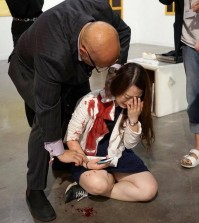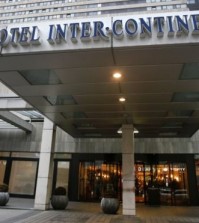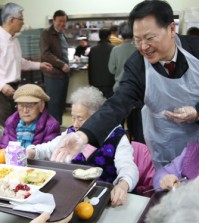- California Assembly OKs highest minimum wage in nation
- S. Korea unveils first graphic cigarette warnings
- US joins with South Korea, Japan in bid to deter North Korea
- LPGA golfer Chun In-gee finally back in action
- S. Korea won’t be top seed in final World Cup qualification round
- US men’s soccer misses 2nd straight Olympics
- US back on track in qualifying with 4-0 win over Guatemala
- High-intensity workout injuries spawn cottage industry
- CDC expands range of Zika mosquitoes into parts of Northeast
- Who knew? ‘The Walking Dead’ is helping families connect
U.S. City Observes Hangeul Day
A city near Silicon Valley in California has decided to hold an annual commemoration for “Korean Alphabet Day,” or Hangeul Day.
The small city of Milpitas has an Asian population that well exceeds 50 percent of the total and has been actively involved in Asian issues. In August, Milpitas adopted a resolution addressing the issue of comfort women who were forced into sexual slavery by the Japanese army during World War II.
The city held a 570th anniversary of Hangeul Day Saturday (local time), with Koo Eun-hee, a chief director of the Milpitas-based Korean Language & Culture Foundation in attendance at the city government office building. The 570th anniversary was counted from the day of the development of “Hangeul” (1443), not of proclamation that took place three years later.
Milpitas Mayor Jose Esteves said in the opening speech that the city was holding the ceremony to pay tribute to the creation of the World Heritage that the Korean alphabet is. UNESCO included Hangeul on the list of “Memory of the World Heritage in 1887.” Korea has redesignated Oct. 9 Hangeul Day to be observed as a national holiday from this year.
Koo also noted how significant it was to celebrate Hangeul Day with foreigners in an American city hall.
Some 70 people including Esteves, Koo and Chung Yoon-ho, a vice consul-general in San Francisco, attended the ceremony
The ceremony comprised of a choral performance celebrating Hangeul’s birthday, showing of a promotional video clip and an ensemble performance by Adroit College students.
It offered opportunities for the participants to experience traditional Korean culture. Some took commemorative pictures while dressed in traditional Korean attire “hanbok,” writing in calligraphy the words “Jikji,” which is the name of the world’s oldest extant book printed with movable metal type, and constructed a model of traditional Korean buildings such as thatched cottages and tile-roofed houses.












![일본 사도광산 [서경덕 교수 제공. 재판매 및 DB 금지]](http://www.koreatimesus.com/wp-content/uploads/2024/07/PYH2024072610800050400_P4-copy-120x134.jpg)


